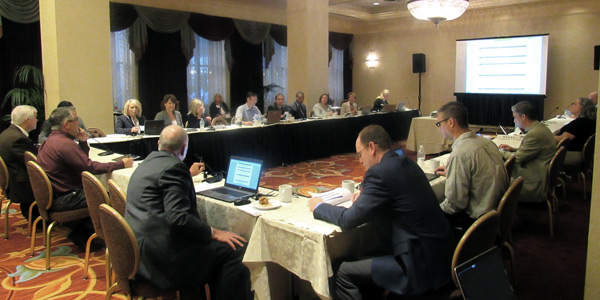Gas-electric topics currently discussed in MISO’s Resource Adequacy Subcommittee will move to the Reliability Subcommittee where they are a better fit, Steering Committee members decided during a Feb. 22 conference call.
Gas-electric coordination is more closely related to grid reliability than resource adequacy, leadership of the two panels said.
“Once I started to review stakeholder comments on its applicability to resource adequacy, I said, ‘Yes, these issues have more applicability to the Reliability Subcommittee,’” said Shawn McFarlane, MISO liaison for the RASC.
RSC Chair Tony Jankowski said he also agreed with the swap.
Among the RSC’s duties will be providing input to MISO on a pilot program that sends hourly estimated gas usage profiles to selected pipeline operators so they have advance notice of generating units’ fuel needs. The profiles are based on MISO’s day-ahead market results. (See “Gas-Electric Discussions in 1st Quarter,” MISO Resource Adequacy Subcommittee Briefs.)
RASC Chair Chris Plante said his subcommittee will continue to talk gas-electric coordination as it relates to implementing a seasonal aspect to the Planning Resource Auction.
MISO Stakeholders to Hear Changes to Alternative Dispute Resolution
MISO will describe proposed changes to its alternative dispute resolution process in a presentation at the March Advisory Committee meeting, repeating the presentation at the April Informational Forum, to ensure wide exposure of the revisions, the Steering Committee decided.
MISO legal counsel Daniel Malabonga said changing Tariff Attachment HH’s language on alternative dispute resolution has been on his “wish list” for years. Malabonga said the attachment is used when parties want to “meet in the middle” over contractual disputes; the revisions include a confidentiality agreement and the legal definition of indispensable parties — parties whose participation is necessary to work out an agreement. MISO’s Alternative Dispute Resolution Committee, which meets in private, has already approved the changes, which have not yet been made public.
Steering Committee Chair Tia Elliott asked that MISO address stakeholder responses before filing the changes with FERC to avoid protest filings.
“Even though this may be on the fast track to being filed, I would like stakeholders to have the opportunity to provide feedback,” Elliot said.
Justin Stewart of MISO’s stakeholder relations unit said the RTO would honor the request.
Auction Redesign Drives 2016 Overspending
MISO Finance Subcommittee Chair Mitch Myhre said the RTO ended 2016 $2.2 million over its operating budget (1%). Capital spending was $2 million (6.5%) over budget. Myhre said both instances of overspending were driven by the development of the rejected capacity auction redesign.
— Amanda Durish Cook





